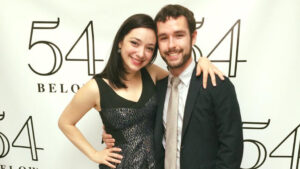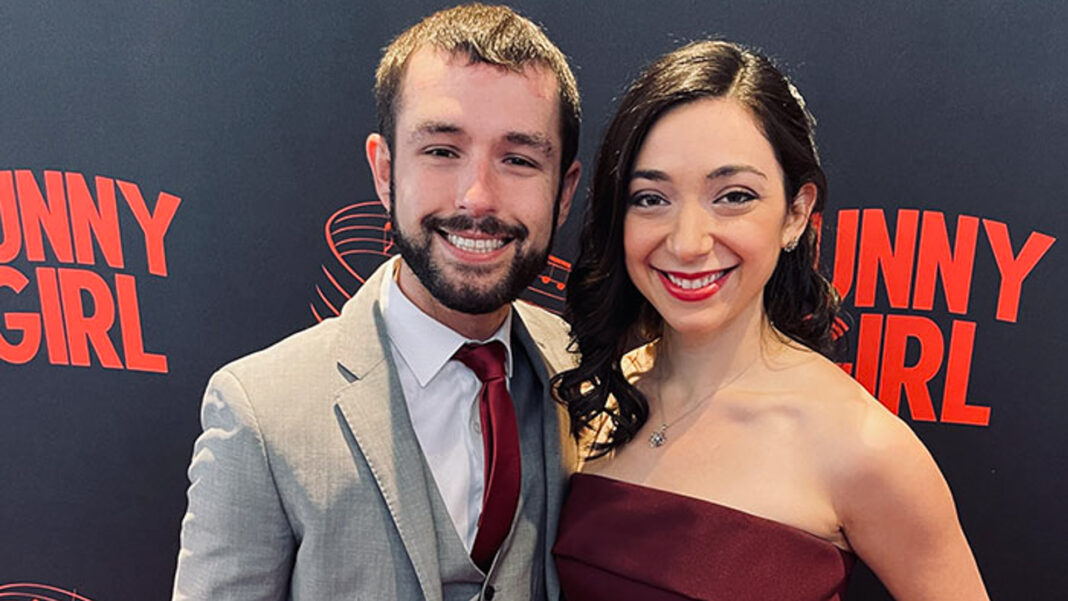“We have so much in common and so much music that we share with each other and create together. But we also have our own careers in separate worlds: Julie in the theatrical world and me more in the jazz and improvised music world.” That’s how jazz musician and composer Jason Yeager (New Songs of Resistance and the upcoming Unstuck in Time: The Kurt Vonnegut Suite) describes the artistic life he shares with his wife, Julie Benko.

Perhaps you didn’t know Julie Benko’s name before this year started. You certainly do now. She was Beanie Feldstein’s understudy in the Broadway revival of Funny Girl who took over the role when Feldstein left the show early. She also did numerous performances as her understudy. Benko will continue as Lea Michele’s understudy once she assumes the role and will also play the part at Thursday night performances.
This is a big week for Benko and Yeager as their album, Hand in Hand, gets released by Club 44 Records on Friday. The album was born out of online Quarantunes the couple did during the pandemic.
Then on Monday they will perform at Birdland Jazz Club in New York. That concert will be live-streamed at 7:00 PM ET/4:00 PM PT so you’ll be able to see the show without having to be in New York.
Having heard an advance copy of the absolutely delightful Hand in Hand, I spoke to the couple about how they merged their musical styles for the album, how their relationship has deepened by being collaborators and about the whirlwind that is Funny Girl. The musical’s signature song, People, is on the album, but it’s a much more personal version of the song than Benko performs at the August Wilson Theatre.
What follows are excerpts from our conversation that have been edited for length and clarity. If you’d like to see the complete interview, please go to our YouTube channel.
Q: Jason, in the press release you’re quoted as saying, “Every song that we chose has a special meaning to us and has grown with us in our relationship.” What does Hand in Hand tell us about your relationship and how you not only weathered the pandemic, but also creatively flourished during it?

Jason: If you play every week with the same person, you develop a certain close musical rapport. Which we already had, but it only deepened through that period because we weren’t collaborating with anyone else. We weren’t able to. So we learned new repertoire and explored new repertoire, we also got suggestions from listeners, family and friends and fans who would tune in online. Many of the songs bring to mind certain memories from that period, as well as memories from New Orleans. Songs that are included on the record bring to mind the several trips that Julie and I have taken there.
Q: Did you find that your relationships with the songs changed from when you first started performing them to when you finally had to cement them in a formal recorded version?
Julie: Some of the songs we recorded so many takes of and they were all so different and we had to choose. Each take was very different: some out of time, some more New Orleans, some more playful and more theatrical, some less so. I think the good news is that we actually have all those other recordings and we could always put them out as an alternate take if anybody wants to hear some of the other fun stuff we had.
Q: The entertainment industry has been filled with married couples who have achieved incredible highs and some who have achieved incredible lows by working so closely with their spouses. What is the best thing about working with your spouse and what is the most challenging?
Jason: I feel we’ve become closer as a couple as a result of our music making. And our musical partnership has become solidified and stronger because we are a couple. I’d say the most challenging aspect is when I mess up I disappoint, not only the vocalist who is the star, but I also disappoint my spouse.
Julie: This is sort of a special thing that we do as opposed to the primary thing that we do. So it really does feel like an escape from all of the really stressful stuff that both of our careers bring us. Making music together actually feels like a vacation because it’s just fun.
He really means it when he says he doesn’t want to disappoint. You have to to find a way to support each other as an artist and as a person and be a cheerleader for both and and be able to make space to hold that.
Q: Is there something from merging musical lives that can serve as a role model for anybody who’s trying to bring to two different voices to shared lives, to different points of views together?
Julie: We have to be so just tuned into the other one so that we can have that call and response. It’s a give and take. It’s a dance. It’s a dialogue. What he plays affects what I sing and vice versa. So I think there’s certainly a lesson in the music for relationships in that way. We actually try to consciously say, I’m going to really listen to you and watch you and be with you, rather than focus on doing the song, quote unquote. The music is better because it’s really just about being present with one another.
Jason: I would only add that also in selecting the the repertoire and creating the arrangements, it was very much a collaborative process that involved bringing songs from Julie’s world and songs from my world together. And then finding, compromise isn’t the right word, but sort of meeting each other at a place esthetically where we both feel at home and excited. That’s a tough combination to reach. We’re different artists and we have different projects and different esthetics that we enjoy. So finding the Venn diagram of where the circles overlap is also kind of a good metaphor for merging two lives together; remaining independent and distinct.
Q: One of the songs that I love on the album is Sweet Pea, not just because it’s dedicated to Billy Strayhorn, but also because it sounds like a song that Strayhorn would have written, which I assume is intentional. What does Strayhorn mean to you?
Jason: I wrote Sweet Pea as a tribute to Strayhorn on his 100th birthday in 2015 and then later added lyrics and knew that I wanted to have Julie sing it. Strayhorn is one of my heroes as an artist. Somebody who, without much of an ego about it, was casually just brilliant beyond what most of us can even conceive. They say that he would write and read scores of music while other music was playing. In other words, he could read a score of music and hear it in his head, or even write one out as though he were writing a letter or reading an article. The man was brilliant beyond belief and he was a brave person as an out gay man in 1940s New York City. He he took part in various civil rights actions as well.
Q: I can’t wait, Julie, for the time when you sing and record Lush Life, which Bettye LaVette told me she is going to spend her entire life trying to get right.
Julie: I know it’s intimidating, honestly. We were actually in tech in Funny Girl. Michael Rafter, who is our music director, who also is a jazz jazz pianist and has been Sutton Foster’s music director for a long time, he just noodles around at the piano in rehearsals. I would just sit there and I was one of the only ones who would recognize what he was playing. I remember he played the four opening bars of Lush Life and I came over and just started singing. He was like, “You know, it?”
Q: Since you brought up this little show that you’re in, obviously there’s no way you could have predicted what this year was going to bring you.
Julie: No, I was not manifesting any of this.
Q: So given the wild shifts and changes that this production has endured, what are the challenges in staying focused and more to the point, enjoying all of the opportunities that this maelstrom has given you?

Julie: Well, there are challenges in that. Obviously there’s the media swarm, which I have not generally enjoyed being a part of when it’s the tabloid kind of stuff. That’s just all speculation. It’s just very upsetting to read because it’s full of lies. You don’t want to even dignify stuff with responses. But I’ve learned how to tune it out and just turn it off. I try to just focus on doing the work.
One of the main challenges is the vocal, physical, emotional exhaustion. But once you are in there it’s put on the costume and see everybody around. You get on the train and you go and it’s a party. The audience is excited to be there and you can feel that. And it’s just such a dream come true and such a joy to get up on stage and do this huge, complex role that requires every bit of you. So you get on the train and try to enjoy the ride.
Q: Are you able to enjoy it, Jason, given everything Julie just said about getting caught up in a lot of the gossip and all the other crap that goes along with this position?
Jason: I feel for Julie. That can be upsetting at times, but I think she’s done a great job of making sure her relationships with her colleagues at work are good and honest and free of that noise. My contribution to that is when none of us knew what was going to happen, I started a thread with the family that Julie is not on. So if there was an article of interest that, say, someone else in the family really needed to share, they could share it there so that everyone except Julie would see it.
Q: Which brings me to the version of People that you have on Hand in Hand. People is one of those songs like Being Alive in a Company where it seems like everybody needs to make it as big as possible at the end. What I love is that you’ve taken this less-is-more approach and made it much more intimate on the album. What did the song reveal to you that maybe you didn’t know before when you started looking at it from that perspective?
Julie: We didn’t know People before I had to audition for Funny Girl.
Jason: And I only knew it from her audition she asked me to accompany her.
Julie: The fact that we didn’t have that long-standing relationship, or feeling like there were expectations we had to fulfill, probably helped allow us to just explore in our own way. The sense we got from the scene was this is about people who are in a seduction, this love that’s beginning. And it’s also about loneliness and connecting. I think when you do it in a show on stage and you have a big theater to fill and have a big orchestra to sing with it, you get to belt things out. But to me, the lyric and the the emotion behind the song of wanting to connect in a very intimate way with someone really spoke to let’s find a way to express that intimacy and the intimacy we feel when we get to play together.
Jason: In the context of our album, which has that kind of intimacy, even on the tracks that are orchestrated with more instruments that we overdubbed, there’s still this little house concert or small salon feeling to the record that’s, we hope, inviting. So that’s the feeling we brought to it. And I was thinking of something like a tango or a bolero, because the song feels like a dance between these two characters. We just came up with a couple ideas the night before the session and then played around with it in the studio
Q: I want to conclude our conversation by asking you about something Fanny Brice said: “Let the world know you as you are, not as you think you should be. Because sooner or later, if you are posing, you will forget the past. And then where are you?”
Julie: I love this quote.
Q: I do, too. So how does Hand in Hand let the world see who the two of you are and how do you think you’ll look back on this maybe ten years from now?
Julie: I think that the album is eclectic. We really bounce around between a lot of different genres and feelings. We try not to let ourselves be limited by genre. It’s not a jazz record. It’s not a theater record. It’s our record and it’s very emblematic of the music that we enjoy listening to and the music that we enjoy creating together.
Jason: I think also that there’s a lot of humor and playfulness on the record as well, which is a part of our relationship and who we are in our home lives. There’s also tenderness and love and respect, I think these are also all values that we try to live out in our home lives and in the world. I think it is a reflection of us individually and as a couple.
Julie: I think that it speaks to the fact that the album is unique and is something that really, truly, came from us and from loving each other.
To see our full interview with Julie Benko and Jason Yeager, please go here.
Main photo: Jason Yeager and Julie Benko (Courtesy Club 44 Records)











